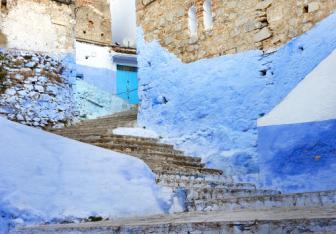Article
April 2016: Introduction to the poetry of Ouidad Benmoussa, Abdelilah Mouissi & Norddine Zouitni
A new sensibility in Moroccan poetry

April 12, 2016
Social media offered a vast space for young poets and writers with real talents to broadcast, publish and exchange their work far from any political or ideological constraints. As a matter of fact, with the advent of the second decade of the 21st century, a new creative wind blew over the Arab world; Morocco was, of course, no exception. Moreover, Moroccan poetry thrived greatly and imposed itself onto the Arab literary scene. It finally ceased to be pushed to the periphery by the Arab Middle-Eastern intelligentsia, which, for historical and logistic reasons, controlled the diffusion of literature in the Arab world.
This shift in poetic sensibility in Morocco is not limited to young poets, although they represent the natural majority, but affects poets from different generations. Hence, alongside young poets such as Moamed Moksidi, Mohammed Benmiloud, Azeddine Bourga, Hassan Boulahouichat, Oulaya El Bouzaidi, Amal Akhdar, Abdellah Belhaj, Najib Moubarak and others, the new literary sensibility thrives with poets from other, more-or-less older generations, such as Abdelilah Mouissi, Yassin Adnan, Taha Adnan, Mohamed Kennouf, Hassaine Benzbir, Adbellatif El Ouarari, Norddine Zouitni, Dami Omar, Fatima Zahra Bennis, Ouidad Benmoussa and Abdeljawad Elkhanifi.
Some of the major characteristics of this new Moroccan poetry seem to be its use of a common Arabic (which leans on Moroccan usage, rather than on the Arab classic, monolithic canon); its self-aware distanciation from the poetic modernist paradigm evolved by early modernist Arab poets such as Adonis and Mahmoud Darwish, its preoccupation with the self and the mundane, and, finally, its immense use of irony and satire.
Moroccan poetry is currently undergoing a phase of great transformation and growth after a long period of stagnancy – which roughly lasted from the 1990’s until the first decade of the 21st century. Moroccan poetry, like most Arab poetry, in fact suffered a lot from the dominance of partisan ideology, which controlled most of the avant-garde written media in the last part of the 20th century, and left a very small margin for so many real talents.
However, with the advent of the information age, things changed in spectacular and melodramatic ways on many levels, but especially on the level of politics and literature.Social media offered a vast space for young poets and writers with real talents to broadcast, publish and exchange their work far from any political or ideological constraints. As a matter of fact, with the advent of the second decade of the 21st century, a new creative wind blew over the Arab world; Morocco was, of course, no exception. Moreover, Moroccan poetry thrived greatly and imposed itself onto the Arab literary scene. It finally ceased to be pushed to the periphery by the Arab Middle-Eastern intelligentsia, which, for historical and logistic reasons, controlled the diffusion of literature in the Arab world.
This shift in poetic sensibility in Morocco is not limited to young poets, although they represent the natural majority, but affects poets from different generations. Hence, alongside young poets such as Moamed Moksidi, Mohammed Benmiloud, Azeddine Bourga, Hassan Boulahouichat, Oulaya El Bouzaidi, Amal Akhdar, Abdellah Belhaj, Najib Moubarak and others, the new literary sensibility thrives with poets from other, more-or-less older generations, such as Abdelilah Mouissi, Yassin Adnan, Taha Adnan, Mohamed Kennouf, Hassaine Benzbir, Adbellatif El Ouarari, Norddine Zouitni, Dami Omar, Fatima Zahra Bennis, Ouidad Benmoussa and Abdeljawad Elkhanifi.
Some of the major characteristics of this new Moroccan poetry seem to be its use of a common Arabic (which leans on Moroccan usage, rather than on the Arab classic, monolithic canon); its self-aware distanciation from the poetic modernist paradigm evolved by early modernist Arab poets such as Adonis and Mahmoud Darwish, its preoccupation with the self and the mundane, and, finally, its immense use of irony and satire.
© Norddine Zouitni
Sponsors
























